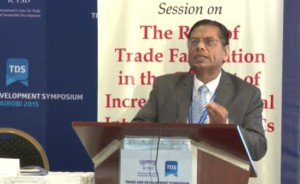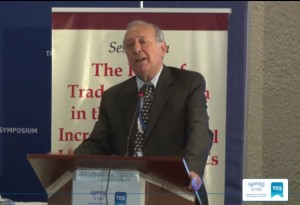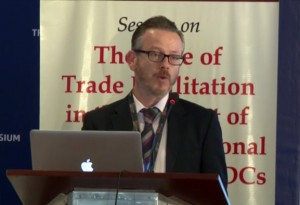Originally posted on the ESCAP website on Tuesday, 3 November 2015. Least Developed Countries and Trade: Challenges of Implementing the Bali…
The Southern Voice and LDC IV Monitor, in association with the Centre for Policy Dialogue(CPD), organised a session titled the Role of Trade Facilitation in the Context of Increasing Regional Integration of Least Developed Countries as part of the Nairobi Trade and Development Symposium (TDS) on 17 December 2015. The symposium was held in the sidelines of the Tenth Ministerial Conference of the World Trade Organization (MC10). At the session, international experts on trade and regional integration explored possible avenues and modalities to implement the much-needed Trade Facilitation (TF) measures which could advance the cause of increasing regional integration of LDC economies.
The session was moderated by Dr Debapriya Bhattacharya, Chair, Southern Voice and LDC IV Monitor, and Distinguished Fellow, CPD. The speakers included Professor Mustafizur Rahman, Executive Director, CPD; Professor Jaime de Melo, Emeritus Professor, University of Geneva; Dr Ratnakar Adhikari, Executive Director, Enhanced Integrated Framework (EIF) Executive Secretariat, World Trade Organization (WTO); and Dr Jodie Keane, The Commonwealth Secretariat. Mr Nicolas Imboden, Partner and Co-founder, IDEAS Centre and Professor Rorden Wilkinson, University of Sussex initiated the discussion on the presentations which was followed by interactive exchanges with the participants of the session. Dr Fahmida Khatun, Research Director, CPD also participated in the discussion.
Dr Bhattacharya offered opening remarks where he emphasised how regional cooperation has emerged as a major vehicle for economic development of LDCs and as a means of strengthened global integration of their economies. Trade facilitation played a key role in deepening trade and investment cooperation among LDCs, promoted labour mobility in the region. Greater regional cooperation also promoted peace and security in the region.
The moderator emphasised that among the different types of regional integration seen in recent times that involved low income countries, South-South Cooperation (SSC) was gaining increasing prominence and importance. In this context, TF was assuming growing relevance to support TF measures. WTO-led Aid for Trade initiative and nationally developed programs involving various international financial institutions were critically important, he stressed.
Professor Mustafizur Rahman identified TF as the last great barrier that LDCs will have to surmount. Regional integration has allowed LDCs to bring down tariffs but non-tariff barriers and measures continue to persist. In this connection, the Trade Facilitation Agreement (TFA) was of high importance to LDCs. The cost of trading within the region was high, especially for Small and Medium Enterprises (SMEs); landlocked countries are particularly disadvantaged. Supply and value chains cannot be developed across the region based on comparative advantages because the cost of intra-industry trade was significantly high. Dr Rahman put emphasis on paperless trade, establishment of single windows, more coordination among various agencies in LDCs, and also coordination among organisations across the borders and between the customs systems. He said that without the implementation of TF measures, it would not be possible to translate the comparative advantage of countries into competitive advantage. LDCs will not be able to integrate regionally and get into the globalisation process from a position of strength, without addressing TF concerns.
Professor Jaime de Melo shed light on issues related to trade cost for LDCs and landlocked LDCs. He based his presentation on OECD’s database on TF. He showed how the trade cost for LDCs was higher than that of developing countries; within LDCs, trade cost was higher for landlocked LDCs because of the involvement of transit countries through which they had to trade.
Dr Ratnakar Adhikari discussed how the EIF works in general; he elaborated on the TF related support that will be provided to LDCs through the next phase of the EIF programme. He also shared his assessment of how effective or ineffective the EIF mechanism has been till date. In the second phase of the EIF, the regional dimension will be given due importance. He also elaborated on channels for support which included SSC at both the regional and bilateral levels.
Dr Jodie Keane spoke about the capability of LDCs to negotiate trade agreements and costs. She felt that there was much scope for further work to deepen land connectivity, air transport, liner shipping and address related logistical issues. In order for LDCs to achieve economic transformations, sequencing and prioritisation of issues must come into play, she said. She mentioned the weak Monitoring and Evaluation Frameworks in place in LDCs and underscored the need for diagnostics and impact assessment.
Mr Nicolas Imboden highlighted the connection between TFA and investment, emphasising that TF is as much about investment as about trade. He dwelt on the reasons why TF has remained weak in LDCs and drew attention to lack of interest on the part of local producers, interests of individuals and organisations profiting from monopolies originating from lack of appropriate TF. Imboden stressed that many of the TF measures can be undertaken at zero cost if the private sector is mobilised.
Professor Rorden Wilkison emphasised the issue of capability flagged by Dr Keane, and spoke about how multiplier effects emanating from TF measures could energise the local economy. He addressed the cultural aspects of trading across borders, and called for greater knowledge among counterparts trading across borders. There was a need for greater awareness about procedures related to border crossing. He also flagged the issue of global health and human security, which are connected to TF. He commented further that the multilateral trading system must be better connected to the UN system in order that trade served the greater interests of countries and people.
The session was followed by an open discussion moderated by Dr Bhattacharya. Discussants posed a number of incisive questions to the speakers and discussants. These included, among others, vested interest groups that worked against TF, costs of non-cooperation in TF, challenges of mobilising funds for TF and role of national agencies to undertake commitments and obligations in view of the TF Agreement adopted at the Bali Ministerial.




